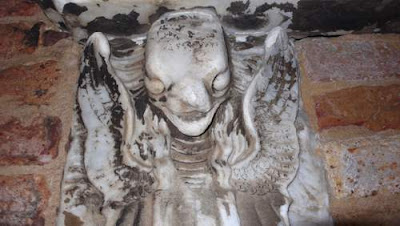 Dear Gentle Reader,
Dear Gentle Reader,| Così di ponte in ponte, altro parlando che la mia comedìa cantar non cura, venimmo; e tenavamo ’l colmo, quando restammo per veder l’altra fessura Quale ne l’arzanà de’ Viniziani ché navicar non ponnoóin quella vece10 chi ribatte da proda e chi da poppa; tal, non per foco ma per divin’ arte, I’ vedea lei, ma non vedëa in essa Mentr’ io là giù fisamente mirava, Allor mi volsi come l’uom cui tarda che, per veder, non indugia ’l partire: Ahi quant’ elli era ne l’aspetto fero! L’omero suo, ch’era aguto e superbo, Del nostro ponte disse: «O Malebranche, a quella terra, che n’è ben fornita:40 Là giù ’l buttò, e per lo scoglio duro Quel s’attuffò, e tornò sù convolto; qui si nuota altrimenti che nel Serchio! Poi l’addentar con più di cento raffi, Non altrimenti i cuoci a’ lor vassalli Lo buon maestro «Acciò che non si paia e per nulla offension che mi sia fatta, Poscia passò di là dal co del ponte; Con quel furore e con quella tempesta usciron quei di sotto al ponticello,70 Innanzi che l’uncin vostro mi pigli, Tutti gridaron: «Vada Malacoda!»; «Credi tu, Malacoda, qui vedermi sanza voler divino e fato destro? Allor li fu l’orgoglio sì caduto, E ’l duca mio a me: «O tu che siedi Per ch’io mi mossi e a lui venni ratto; così vid’ ïo già temer li fanti I’ m’accostai con tutta la persona Ei chinavan li raffi e «Vuo’ che ’l tocchi»,100 Ma quel demonio che tenea sermone Poi disse a noi: «Più oltre andar per questo E se l’andare avante pur vi piace, Ier, più oltre cinqu’ ore che quest’ otta, Io mando verso là di questi miei «Tra’ti avante, Alichino, e Calcabrina», Libicocco vegn’ oltre e Draghignazzo, Cercate ’ntorno le boglienti pane; «Omè, maestro, che è quel ch’i’ veggio?», Se tu se’ sì accorto come suoli,130 Ed elli a me: «Non vo’ che tu paventi; Per l’argine sinistro volta dienno; ed elli avea del cul fatto trombetta. | From bridge to bridge thus, speaking other things Of which my Comedy cares not to sing, We came along, and held the summit, when We halted to behold another fissure As in the Arsenal of the Venetians For sail they cannot; and instead thereof10 One hammers at the prow, one at the stern, Thus, not by fire, but by the art divine, I saw it, but I did not see within it The while below there fixedly I gazed, Then I turned round, as one who is impatient Who, while he looks, delays not his departure; Ah, how ferocious was he in his aspect! His shoulders, which sharp-pointed were and high, From off our bridge, he said: "O Malebranche, Unto that town, which is well furnished with them.40 He hurled him down, and over the hard crag The other sank, and rose again face downward; Here swims one otherwise than in the Serchio; They seized him then with more than a hundred rakes; Not otherwise the cooks their scullions make Said the good Master to me: "That it be not And for no outrage that is done to me Then he passed on beyond the bridge's head, With the same fury, and the same uproar, They issued from beneath the little bridge,70 Before those hooks of yours lay hold of me, They all cried out: "Let Malacoda go;" "Thinkest thou, Malacoda, to behold me Without the will divine, and fate auspicious? Then was his arrogance so humbled in him, And unto me my Guide: "O thou, who sittest Wherefore I started and came swiftly to him; And thus beheld I once afraid the soldiers Close did I press myself with all my person They lowered their rakes, and "Wilt thou have me hit him,"100 But the same demon who was holding parley Then said to us: "You can no farther go And if it still doth please you to go onward, Yesterday, five hours later than this hour, I send in that direction some of mine Step forward, Alichino and Calcabrina," Come forward, Libicocco and Draghignazzo, Search ye all round about the boiling pitch; "O me! what is it, Master, that I see? If thou art as observant as thy wont is,130 And he to me: "I will not have thee fear; Along the left-hand dike they wheeled about; And he had made a trumpet of his rump. |









No comments:
Post a Comment